Land law Assignment (PDF)
VerifiedAdded on 2021/05/31
|10
|2591
|273
AI Summary
Contribute Materials
Your contribution can guide someone’s learning journey. Share your
documents today.
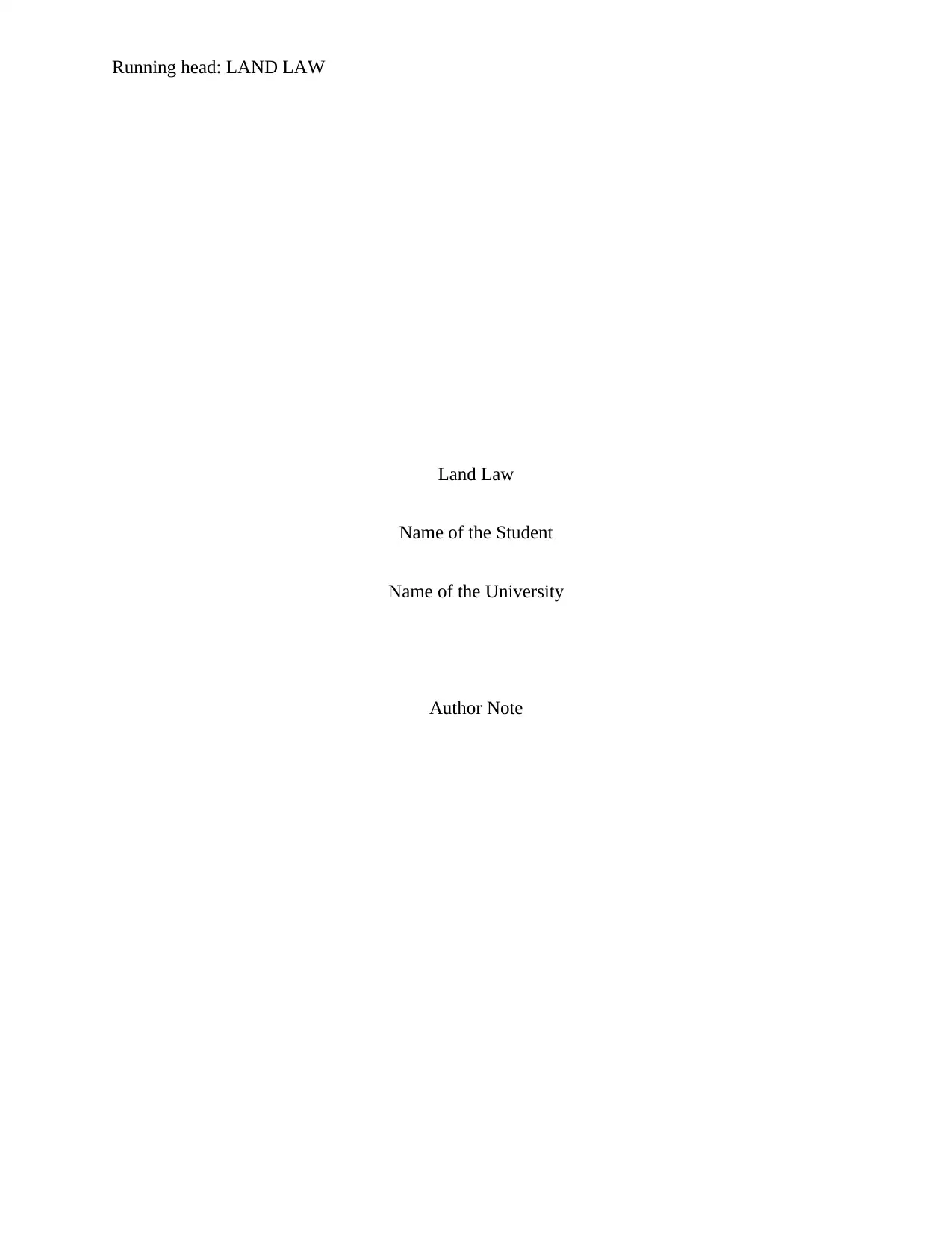
Running head: LAND LAW
Land Law
Name of the Student
Name of the University
Author Note
Land Law
Name of the Student
Name of the University
Author Note
Secure Best Marks with AI Grader
Need help grading? Try our AI Grader for instant feedback on your assignments.
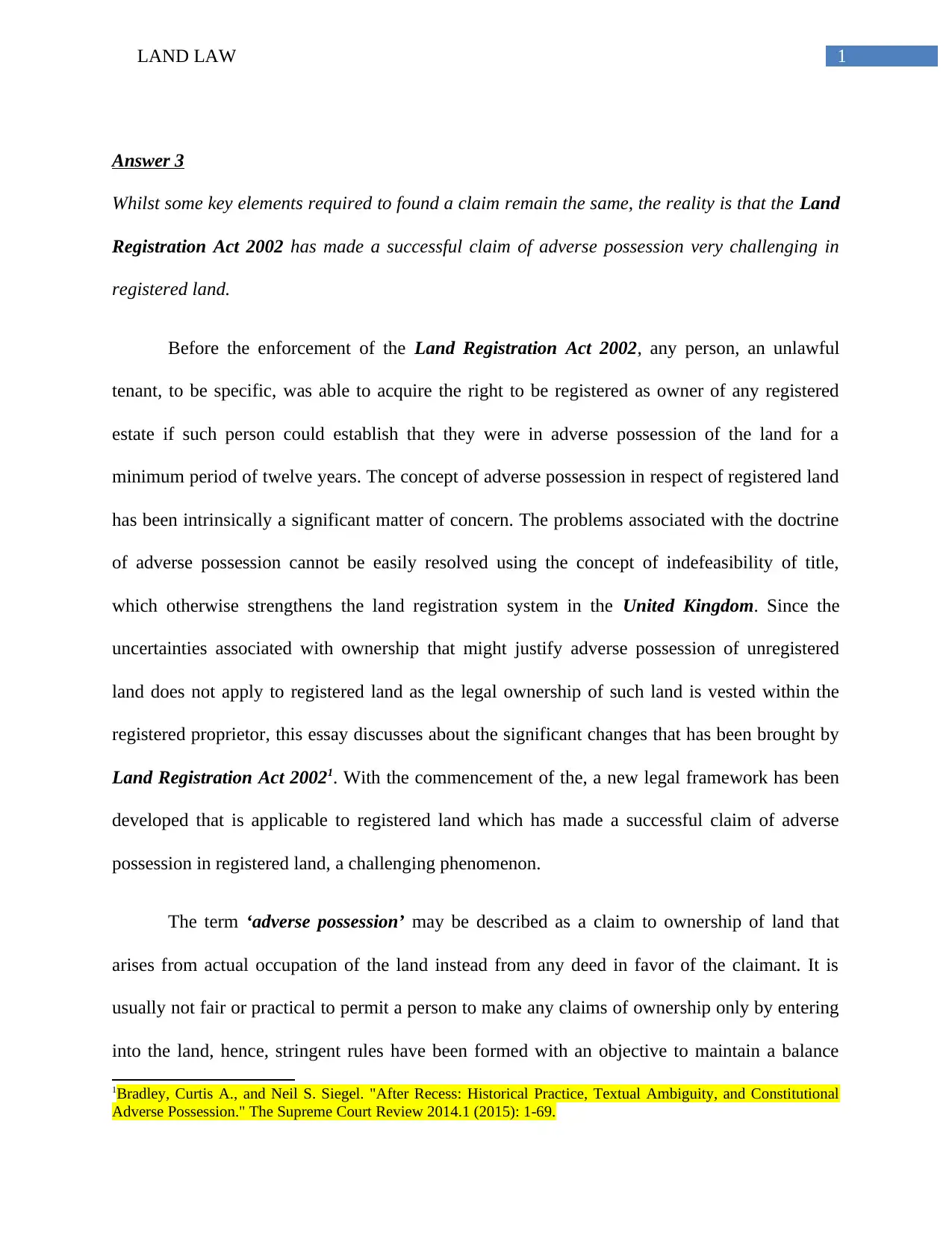
1LAND LAW
Answer 3
Whilst some key elements required to found a claim remain the same, the reality is that the Land
Registration Act 2002 has made a successful claim of adverse possession very challenging in
registered land.
Before the enforcement of the Land Registration Act 2002, any person, an unlawful
tenant, to be specific, was able to acquire the right to be registered as owner of any registered
estate if such person could establish that they were in adverse possession of the land for a
minimum period of twelve years. The concept of adverse possession in respect of registered land
has been intrinsically a significant matter of concern. The problems associated with the doctrine
of adverse possession cannot be easily resolved using the concept of indefeasibility of title,
which otherwise strengthens the land registration system in the United Kingdom. Since the
uncertainties associated with ownership that might justify adverse possession of unregistered
land does not apply to registered land as the legal ownership of such land is vested within the
registered proprietor, this essay discusses about the significant changes that has been brought by
Land Registration Act 20021. With the commencement of the, a new legal framework has been
developed that is applicable to registered land which has made a successful claim of adverse
possession in registered land, a challenging phenomenon.
The term ‘adverse possession’ may be described as a claim to ownership of land that
arises from actual occupation of the land instead from any deed in favor of the claimant. It is
usually not fair or practical to permit a person to make any claims of ownership only by entering
into the land, hence, stringent rules have been formed with an objective to maintain a balance
1Bradley, Curtis A., and Neil S. Siegel. "After Recess: Historical Practice, Textual Ambiguity, and Constitutional
Adverse Possession." The Supreme Court Review 2014.1 (2015): 1-69.
Answer 3
Whilst some key elements required to found a claim remain the same, the reality is that the Land
Registration Act 2002 has made a successful claim of adverse possession very challenging in
registered land.
Before the enforcement of the Land Registration Act 2002, any person, an unlawful
tenant, to be specific, was able to acquire the right to be registered as owner of any registered
estate if such person could establish that they were in adverse possession of the land for a
minimum period of twelve years. The concept of adverse possession in respect of registered land
has been intrinsically a significant matter of concern. The problems associated with the doctrine
of adverse possession cannot be easily resolved using the concept of indefeasibility of title,
which otherwise strengthens the land registration system in the United Kingdom. Since the
uncertainties associated with ownership that might justify adverse possession of unregistered
land does not apply to registered land as the legal ownership of such land is vested within the
registered proprietor, this essay discusses about the significant changes that has been brought by
Land Registration Act 20021. With the commencement of the, a new legal framework has been
developed that is applicable to registered land which has made a successful claim of adverse
possession in registered land, a challenging phenomenon.
The term ‘adverse possession’ may be described as a claim to ownership of land that
arises from actual occupation of the land instead from any deed in favor of the claimant. It is
usually not fair or practical to permit a person to make any claims of ownership only by entering
into the land, hence, stringent rules have been formed with an objective to maintain a balance
1Bradley, Curtis A., and Neil S. Siegel. "After Recess: Historical Practice, Textual Ambiguity, and Constitutional
Adverse Possession." The Supreme Court Review 2014.1 (2015): 1-69.
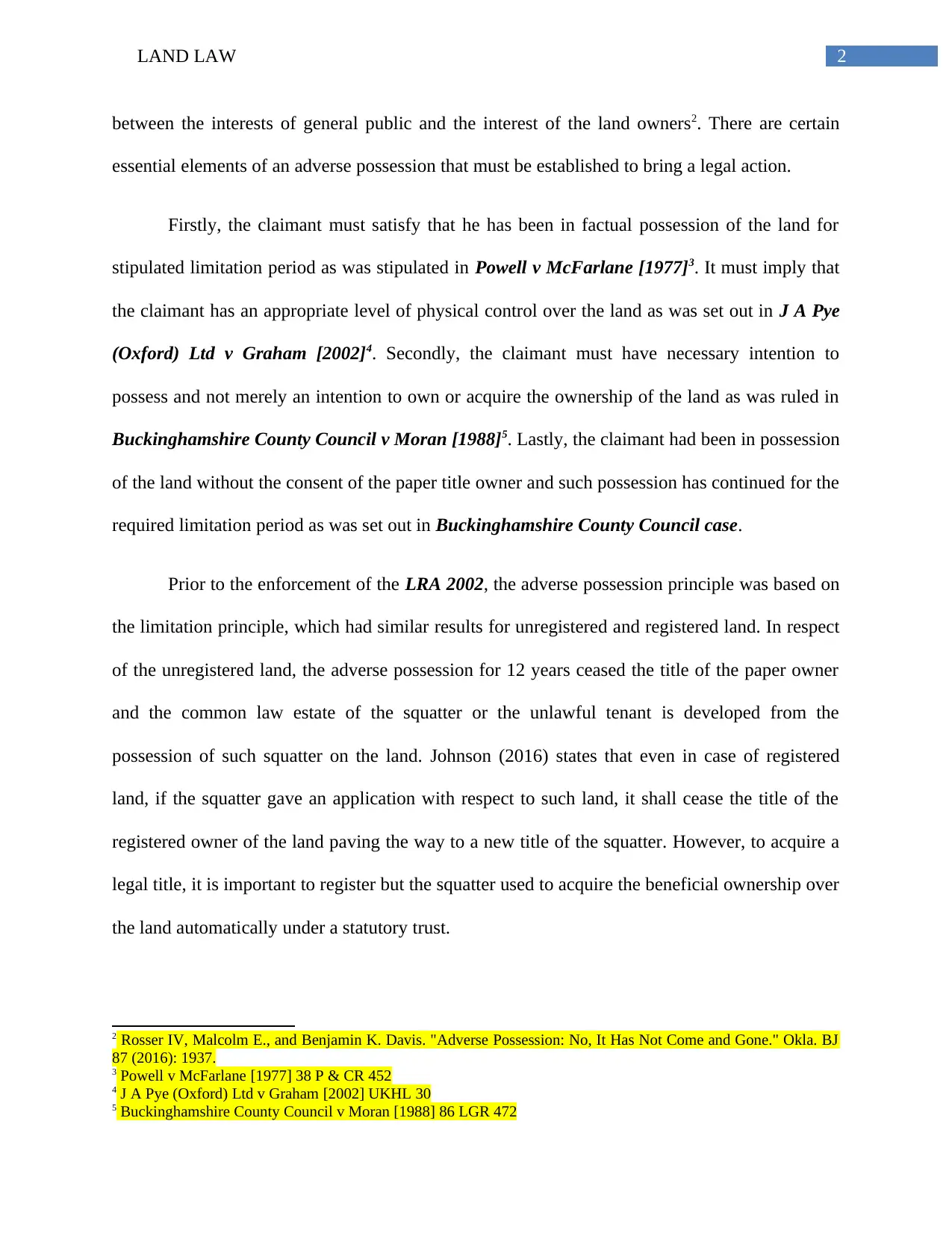
2LAND LAW
between the interests of general public and the interest of the land owners2. There are certain
essential elements of an adverse possession that must be established to bring a legal action.
Firstly, the claimant must satisfy that he has been in factual possession of the land for
stipulated limitation period as was stipulated in Powell v McFarlane [1977]3. It must imply that
the claimant has an appropriate level of physical control over the land as was set out in J A Pye
(Oxford) Ltd v Graham [2002]4. Secondly, the claimant must have necessary intention to
possess and not merely an intention to own or acquire the ownership of the land as was ruled in
Buckinghamshire County Council v Moran [1988]5. Lastly, the claimant had been in possession
of the land without the consent of the paper title owner and such possession has continued for the
required limitation period as was set out in Buckinghamshire County Council case.
Prior to the enforcement of the LRA 2002, the adverse possession principle was based on
the limitation principle, which had similar results for unregistered and registered land. In respect
of the unregistered land, the adverse possession for 12 years ceased the title of the paper owner
and the common law estate of the squatter or the unlawful tenant is developed from the
possession of such squatter on the land. Johnson (2016) states that even in case of registered
land, if the squatter gave an application with respect to such land, it shall cease the title of the
registered owner of the land paving the way to a new title of the squatter. However, to acquire a
legal title, it is important to register but the squatter used to acquire the beneficial ownership over
the land automatically under a statutory trust.
2 Rosser IV, Malcolm E., and Benjamin K. Davis. "Adverse Possession: No, It Has Not Come and Gone." Okla. BJ
87 (2016): 1937.
3 Powell v McFarlane [1977] 38 P & CR 452
4 J A Pye (Oxford) Ltd v Graham [2002] UKHL 30
5 Buckinghamshire County Council v Moran [1988] 86 LGR 472
between the interests of general public and the interest of the land owners2. There are certain
essential elements of an adverse possession that must be established to bring a legal action.
Firstly, the claimant must satisfy that he has been in factual possession of the land for
stipulated limitation period as was stipulated in Powell v McFarlane [1977]3. It must imply that
the claimant has an appropriate level of physical control over the land as was set out in J A Pye
(Oxford) Ltd v Graham [2002]4. Secondly, the claimant must have necessary intention to
possess and not merely an intention to own or acquire the ownership of the land as was ruled in
Buckinghamshire County Council v Moran [1988]5. Lastly, the claimant had been in possession
of the land without the consent of the paper title owner and such possession has continued for the
required limitation period as was set out in Buckinghamshire County Council case.
Prior to the enforcement of the LRA 2002, the adverse possession principle was based on
the limitation principle, which had similar results for unregistered and registered land. In respect
of the unregistered land, the adverse possession for 12 years ceased the title of the paper owner
and the common law estate of the squatter or the unlawful tenant is developed from the
possession of such squatter on the land. Johnson (2016) states that even in case of registered
land, if the squatter gave an application with respect to such land, it shall cease the title of the
registered owner of the land paving the way to a new title of the squatter. However, to acquire a
legal title, it is important to register but the squatter used to acquire the beneficial ownership over
the land automatically under a statutory trust.
2 Rosser IV, Malcolm E., and Benjamin K. Davis. "Adverse Possession: No, It Has Not Come and Gone." Okla. BJ
87 (2016): 1937.
3 Powell v McFarlane [1977] 38 P & CR 452
4 J A Pye (Oxford) Ltd v Graham [2002] UKHL 30
5 Buckinghamshire County Council v Moran [1988] 86 LGR 472
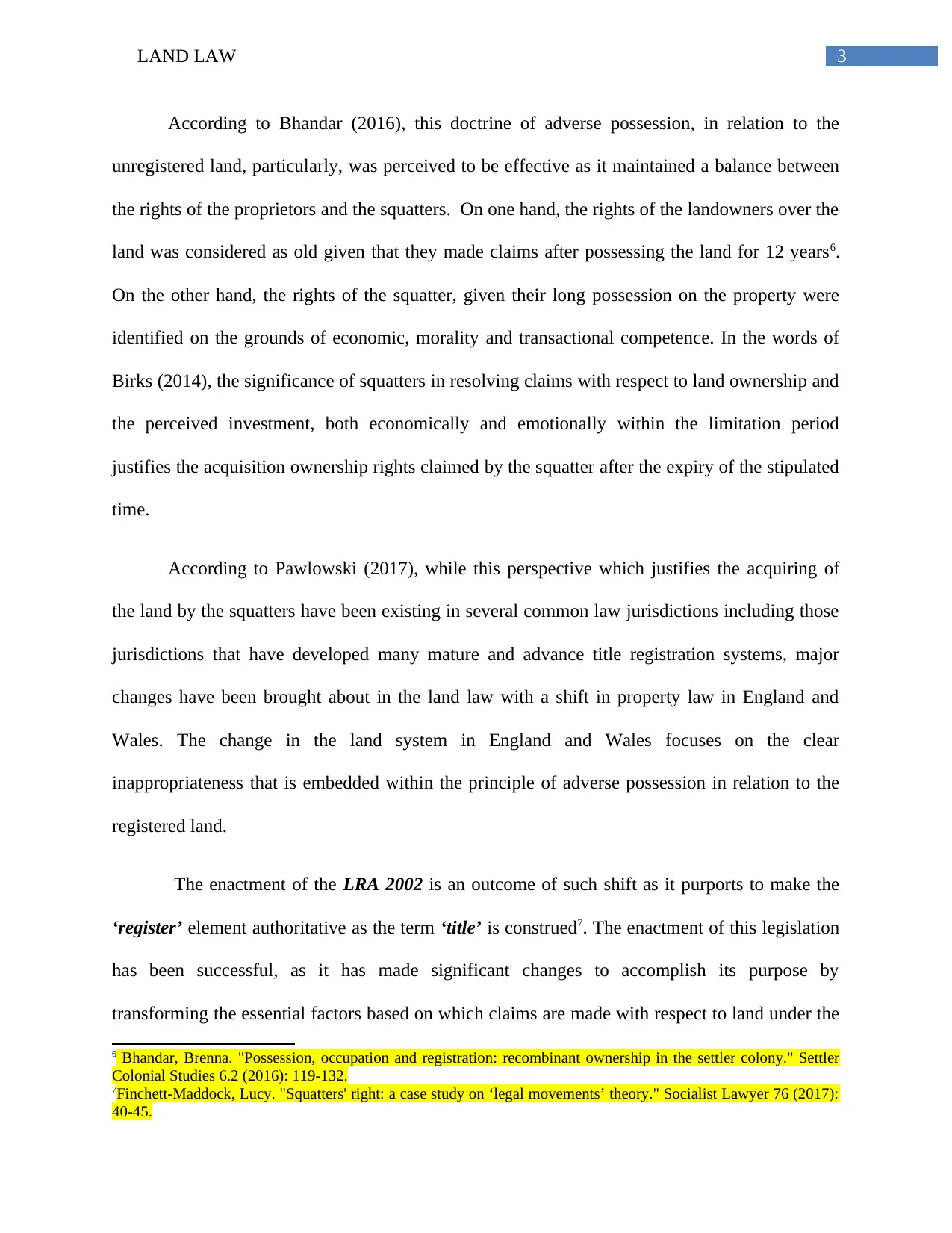
3LAND LAW
According to Bhandar (2016), this doctrine of adverse possession, in relation to the
unregistered land, particularly, was perceived to be effective as it maintained a balance between
the rights of the proprietors and the squatters. On one hand, the rights of the landowners over the
land was considered as old given that they made claims after possessing the land for 12 years6.
On the other hand, the rights of the squatter, given their long possession on the property were
identified on the grounds of economic, morality and transactional competence. In the words of
Birks (2014), the significance of squatters in resolving claims with respect to land ownership and
the perceived investment, both economically and emotionally within the limitation period
justifies the acquisition ownership rights claimed by the squatter after the expiry of the stipulated
time.
According to Pawlowski (2017), while this perspective which justifies the acquiring of
the land by the squatters have been existing in several common law jurisdictions including those
jurisdictions that have developed many mature and advance title registration systems, major
changes have been brought about in the land law with a shift in property law in England and
Wales. The change in the land system in England and Wales focuses on the clear
inappropriateness that is embedded within the principle of adverse possession in relation to the
registered land.
The enactment of the LRA 2002 is an outcome of such shift as it purports to make the
‘register’ element authoritative as the term ‘title’ is construed7. The enactment of this legislation
has been successful, as it has made significant changes to accomplish its purpose by
transforming the essential factors based on which claims are made with respect to land under the
6 Bhandar, Brenna. "Possession, occupation and registration: recombinant ownership in the settler colony." Settler
Colonial Studies 6.2 (2016): 119-132.
7Finchett-Maddock, Lucy. "Squatters' right: a case study on ‘legal movements’ theory." Socialist Lawyer 76 (2017):
40-45.
According to Bhandar (2016), this doctrine of adverse possession, in relation to the
unregistered land, particularly, was perceived to be effective as it maintained a balance between
the rights of the proprietors and the squatters. On one hand, the rights of the landowners over the
land was considered as old given that they made claims after possessing the land for 12 years6.
On the other hand, the rights of the squatter, given their long possession on the property were
identified on the grounds of economic, morality and transactional competence. In the words of
Birks (2014), the significance of squatters in resolving claims with respect to land ownership and
the perceived investment, both economically and emotionally within the limitation period
justifies the acquisition ownership rights claimed by the squatter after the expiry of the stipulated
time.
According to Pawlowski (2017), while this perspective which justifies the acquiring of
the land by the squatters have been existing in several common law jurisdictions including those
jurisdictions that have developed many mature and advance title registration systems, major
changes have been brought about in the land law with a shift in property law in England and
Wales. The change in the land system in England and Wales focuses on the clear
inappropriateness that is embedded within the principle of adverse possession in relation to the
registered land.
The enactment of the LRA 2002 is an outcome of such shift as it purports to make the
‘register’ element authoritative as the term ‘title’ is construed7. The enactment of this legislation
has been successful, as it has made significant changes to accomplish its purpose by
transforming the essential factors based on which claims are made with respect to land under the
6 Bhandar, Brenna. "Possession, occupation and registration: recombinant ownership in the settler colony." Settler
Colonial Studies 6.2 (2016): 119-132.
7Finchett-Maddock, Lucy. "Squatters' right: a case study on ‘legal movements’ theory." Socialist Lawyer 76 (2017):
40-45.
Secure Best Marks with AI Grader
Need help grading? Try our AI Grader for instant feedback on your assignments.
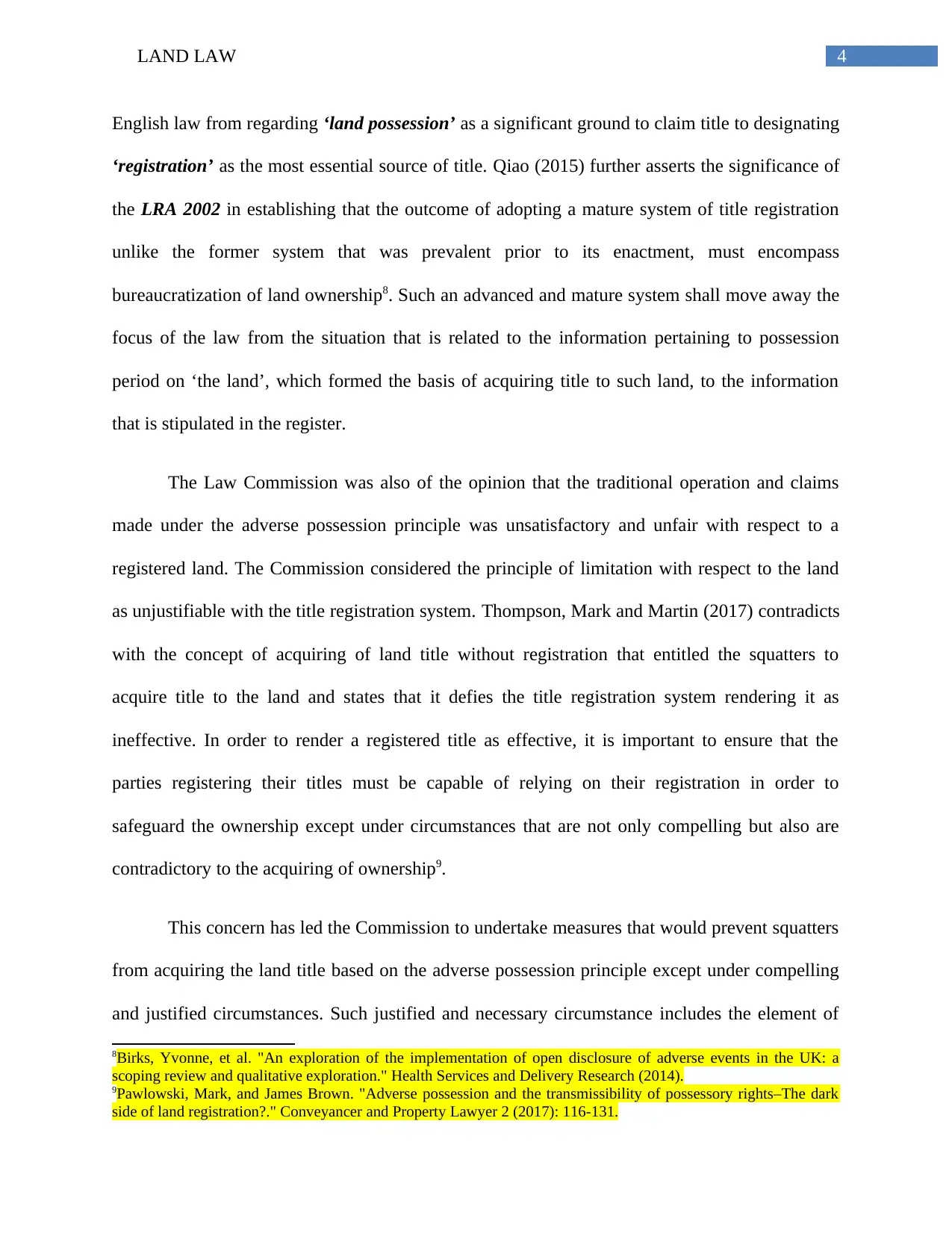
4LAND LAW
English law from regarding ‘land possession’ as a significant ground to claim title to designating
‘registration’ as the most essential source of title. Qiao (2015) further asserts the significance of
the LRA 2002 in establishing that the outcome of adopting a mature system of title registration
unlike the former system that was prevalent prior to its enactment, must encompass
bureaucratization of land ownership8. Such an advanced and mature system shall move away the
focus of the law from the situation that is related to the information pertaining to possession
period on ‘the land’, which formed the basis of acquiring title to such land, to the information
that is stipulated in the register.
The Law Commission was also of the opinion that the traditional operation and claims
made under the adverse possession principle was unsatisfactory and unfair with respect to a
registered land. The Commission considered the principle of limitation with respect to the land
as unjustifiable with the title registration system. Thompson, Mark and Martin (2017) contradicts
with the concept of acquiring of land title without registration that entitled the squatters to
acquire title to the land and states that it defies the title registration system rendering it as
ineffective. In order to render a registered title as effective, it is important to ensure that the
parties registering their titles must be capable of relying on their registration in order to
safeguard the ownership except under circumstances that are not only compelling but also are
contradictory to the acquiring of ownership9.
This concern has led the Commission to undertake measures that would prevent squatters
from acquiring the land title based on the adverse possession principle except under compelling
and justified circumstances. Such justified and necessary circumstance includes the element of
8Birks, Yvonne, et al. "An exploration of the implementation of open disclosure of adverse events in the UK: a
scoping review and qualitative exploration." Health Services and Delivery Research (2014).
9Pawlowski, Mark, and James Brown. "Adverse possession and the transmissibility of possessory rights–The dark
side of land registration?." Conveyancer and Property Lawyer 2 (2017): 116-131.
English law from regarding ‘land possession’ as a significant ground to claim title to designating
‘registration’ as the most essential source of title. Qiao (2015) further asserts the significance of
the LRA 2002 in establishing that the outcome of adopting a mature system of title registration
unlike the former system that was prevalent prior to its enactment, must encompass
bureaucratization of land ownership8. Such an advanced and mature system shall move away the
focus of the law from the situation that is related to the information pertaining to possession
period on ‘the land’, which formed the basis of acquiring title to such land, to the information
that is stipulated in the register.
The Law Commission was also of the opinion that the traditional operation and claims
made under the adverse possession principle was unsatisfactory and unfair with respect to a
registered land. The Commission considered the principle of limitation with respect to the land
as unjustifiable with the title registration system. Thompson, Mark and Martin (2017) contradicts
with the concept of acquiring of land title without registration that entitled the squatters to
acquire title to the land and states that it defies the title registration system rendering it as
ineffective. In order to render a registered title as effective, it is important to ensure that the
parties registering their titles must be capable of relying on their registration in order to
safeguard the ownership except under circumstances that are not only compelling but also are
contradictory to the acquiring of ownership9.
This concern has led the Commission to undertake measures that would prevent squatters
from acquiring the land title based on the adverse possession principle except under compelling
and justified circumstances. Such justified and necessary circumstance includes the element of
8Birks, Yvonne, et al. "An exploration of the implementation of open disclosure of adverse events in the UK: a
scoping review and qualitative exploration." Health Services and Delivery Research (2014).
9Pawlowski, Mark, and James Brown. "Adverse possession and the transmissibility of possessory rights–The dark
side of land registration?." Conveyancer and Property Lawyer 2 (2017): 116-131.
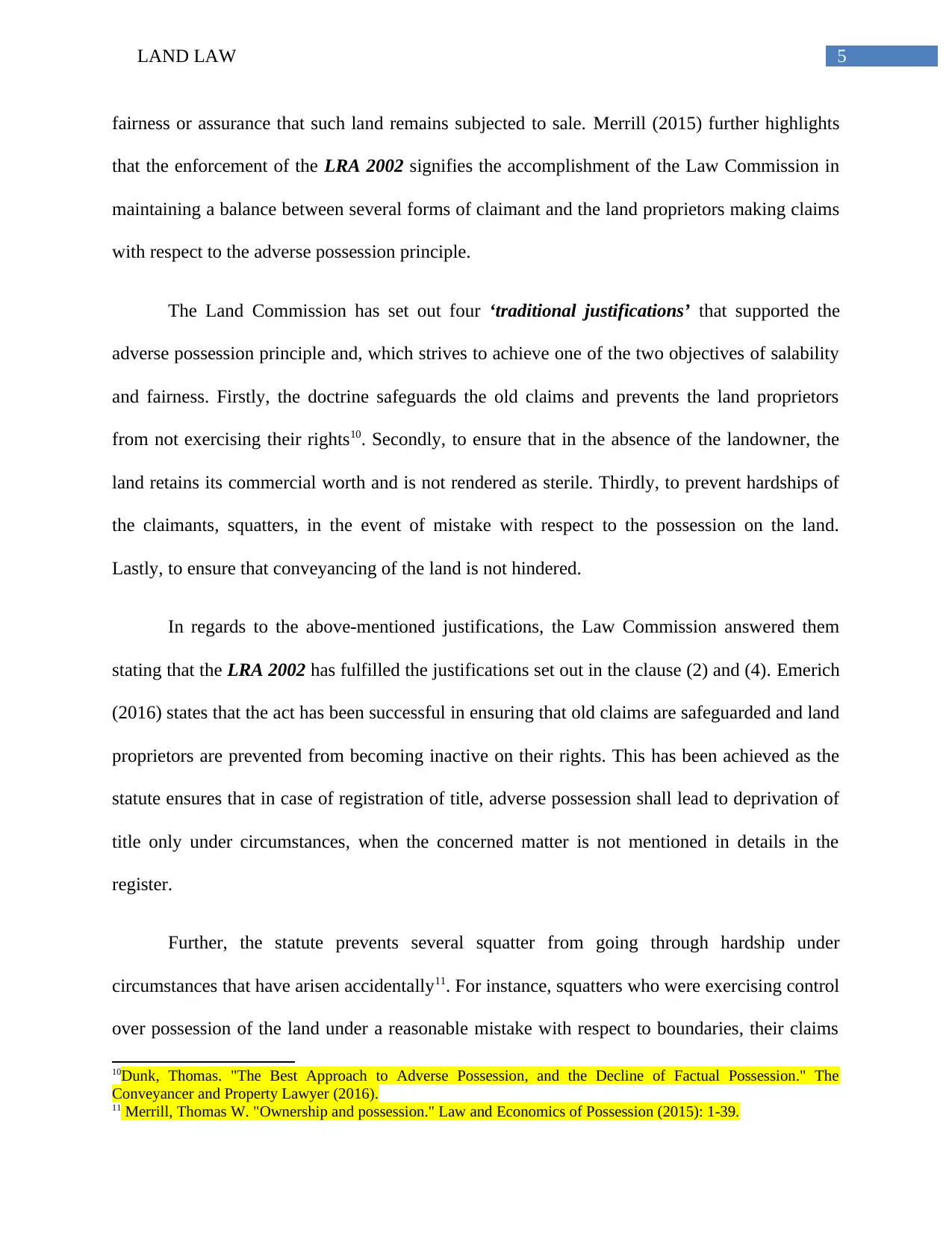
5LAND LAW
fairness or assurance that such land remains subjected to sale. Merrill (2015) further highlights
that the enforcement of the LRA 2002 signifies the accomplishment of the Law Commission in
maintaining a balance between several forms of claimant and the land proprietors making claims
with respect to the adverse possession principle.
The Land Commission has set out four ‘traditional justifications’ that supported the
adverse possession principle and, which strives to achieve one of the two objectives of salability
and fairness. Firstly, the doctrine safeguards the old claims and prevents the land proprietors
from not exercising their rights10. Secondly, to ensure that in the absence of the landowner, the
land retains its commercial worth and is not rendered as sterile. Thirdly, to prevent hardships of
the claimants, squatters, in the event of mistake with respect to the possession on the land.
Lastly, to ensure that conveyancing of the land is not hindered.
In regards to the above-mentioned justifications, the Law Commission answered them
stating that the LRA 2002 has fulfilled the justifications set out in the clause (2) and (4). Emerich
(2016) states that the act has been successful in ensuring that old claims are safeguarded and land
proprietors are prevented from becoming inactive on their rights. This has been achieved as the
statute ensures that in case of registration of title, adverse possession shall lead to deprivation of
title only under circumstances, when the concerned matter is not mentioned in details in the
register.
Further, the statute prevents several squatter from going through hardship under
circumstances that have arisen accidentally11. For instance, squatters who were exercising control
over possession of the land under a reasonable mistake with respect to boundaries, their claims
10Dunk, Thomas. "The Best Approach to Adverse Possession, and the Decline of Factual Possession." The
Conveyancer and Property Lawyer (2016).
11 Merrill, Thomas W. "Ownership and possession." Law and Economics of Possession (2015): 1-39.
fairness or assurance that such land remains subjected to sale. Merrill (2015) further highlights
that the enforcement of the LRA 2002 signifies the accomplishment of the Law Commission in
maintaining a balance between several forms of claimant and the land proprietors making claims
with respect to the adverse possession principle.
The Land Commission has set out four ‘traditional justifications’ that supported the
adverse possession principle and, which strives to achieve one of the two objectives of salability
and fairness. Firstly, the doctrine safeguards the old claims and prevents the land proprietors
from not exercising their rights10. Secondly, to ensure that in the absence of the landowner, the
land retains its commercial worth and is not rendered as sterile. Thirdly, to prevent hardships of
the claimants, squatters, in the event of mistake with respect to the possession on the land.
Lastly, to ensure that conveyancing of the land is not hindered.
In regards to the above-mentioned justifications, the Law Commission answered them
stating that the LRA 2002 has fulfilled the justifications set out in the clause (2) and (4). Emerich
(2016) states that the act has been successful in ensuring that old claims are safeguarded and land
proprietors are prevented from becoming inactive on their rights. This has been achieved as the
statute ensures that in case of registration of title, adverse possession shall lead to deprivation of
title only under circumstances, when the concerned matter is not mentioned in details in the
register.
Further, the statute prevents several squatter from going through hardship under
circumstances that have arisen accidentally11. For instance, squatters who were exercising control
over possession of the land under a reasonable mistake with respect to boundaries, their claims
10Dunk, Thomas. "The Best Approach to Adverse Possession, and the Decline of Factual Possession." The
Conveyancer and Property Lawyer (2016).
11 Merrill, Thomas W. "Ownership and possession." Law and Economics of Possession (2015): 1-39.
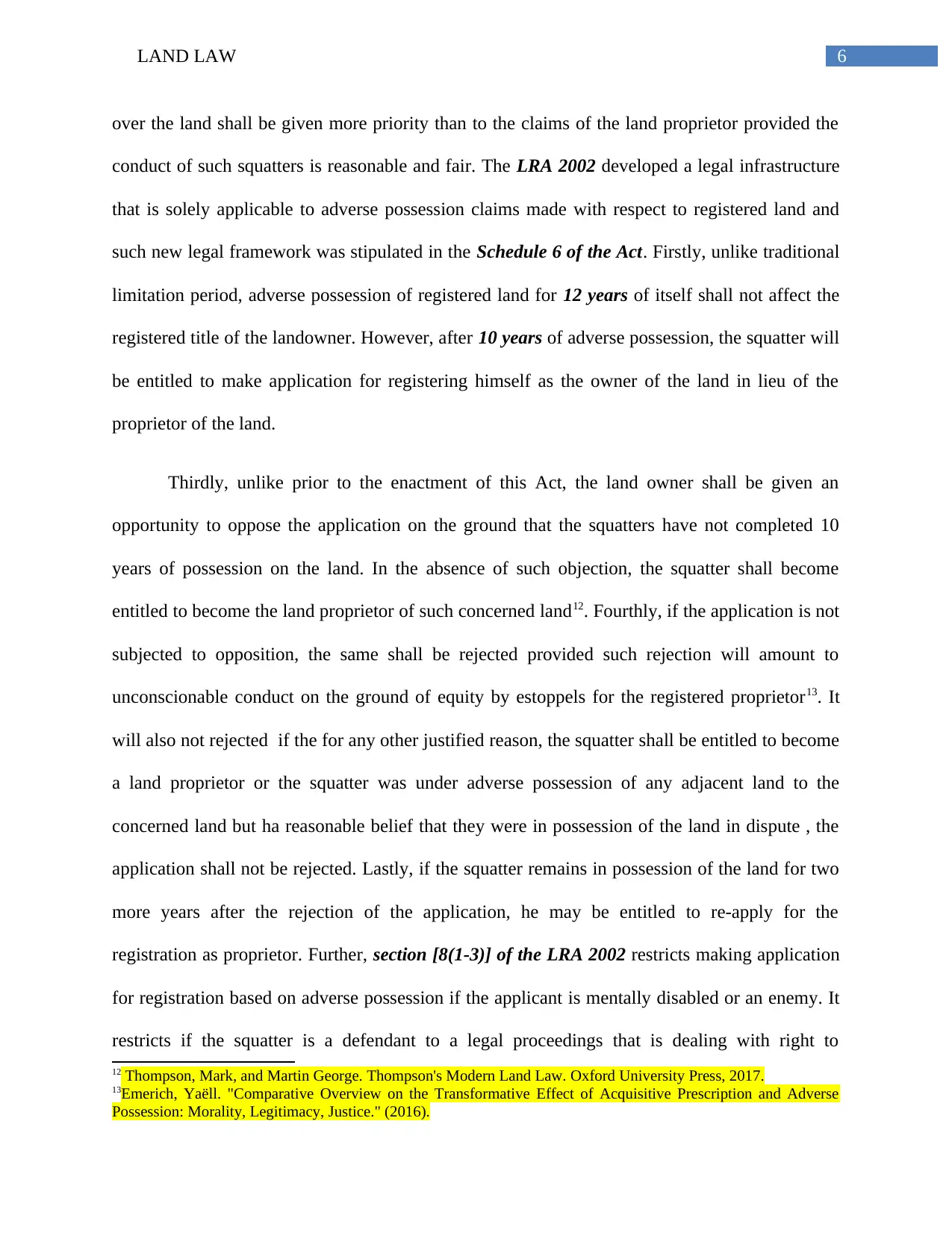
6LAND LAW
over the land shall be given more priority than to the claims of the land proprietor provided the
conduct of such squatters is reasonable and fair. The LRA 2002 developed a legal infrastructure
that is solely applicable to adverse possession claims made with respect to registered land and
such new legal framework was stipulated in the Schedule 6 of the Act. Firstly, unlike traditional
limitation period, adverse possession of registered land for 12 years of itself shall not affect the
registered title of the landowner. However, after 10 years of adverse possession, the squatter will
be entitled to make application for registering himself as the owner of the land in lieu of the
proprietor of the land.
Thirdly, unlike prior to the enactment of this Act, the land owner shall be given an
opportunity to oppose the application on the ground that the squatters have not completed 10
years of possession on the land. In the absence of such objection, the squatter shall become
entitled to become the land proprietor of such concerned land12. Fourthly, if the application is not
subjected to opposition, the same shall be rejected provided such rejection will amount to
unconscionable conduct on the ground of equity by estoppels for the registered proprietor13. It
will also not rejected if the for any other justified reason, the squatter shall be entitled to become
a land proprietor or the squatter was under adverse possession of any adjacent land to the
concerned land but ha reasonable belief that they were in possession of the land in dispute , the
application shall not be rejected. Lastly, if the squatter remains in possession of the land for two
more years after the rejection of the application, he may be entitled to re-apply for the
registration as proprietor. Further, section [8(1-3)] of the LRA 2002 restricts making application
for registration based on adverse possession if the applicant is mentally disabled or an enemy. It
restricts if the squatter is a defendant to a legal proceedings that is dealing with right to
12 Thompson, Mark, and Martin George. Thompson's Modern Land Law. Oxford University Press, 2017.
13Emerich, Yaëll. "Comparative Overview on the Transformative Effect of Acquisitive Prescription and Adverse
Possession: Morality, Legitimacy, Justice." (2016).
over the land shall be given more priority than to the claims of the land proprietor provided the
conduct of such squatters is reasonable and fair. The LRA 2002 developed a legal infrastructure
that is solely applicable to adverse possession claims made with respect to registered land and
such new legal framework was stipulated in the Schedule 6 of the Act. Firstly, unlike traditional
limitation period, adverse possession of registered land for 12 years of itself shall not affect the
registered title of the landowner. However, after 10 years of adverse possession, the squatter will
be entitled to make application for registering himself as the owner of the land in lieu of the
proprietor of the land.
Thirdly, unlike prior to the enactment of this Act, the land owner shall be given an
opportunity to oppose the application on the ground that the squatters have not completed 10
years of possession on the land. In the absence of such objection, the squatter shall become
entitled to become the land proprietor of such concerned land12. Fourthly, if the application is not
subjected to opposition, the same shall be rejected provided such rejection will amount to
unconscionable conduct on the ground of equity by estoppels for the registered proprietor13. It
will also not rejected if the for any other justified reason, the squatter shall be entitled to become
a land proprietor or the squatter was under adverse possession of any adjacent land to the
concerned land but ha reasonable belief that they were in possession of the land in dispute , the
application shall not be rejected. Lastly, if the squatter remains in possession of the land for two
more years after the rejection of the application, he may be entitled to re-apply for the
registration as proprietor. Further, section [8(1-3)] of the LRA 2002 restricts making application
for registration based on adverse possession if the applicant is mentally disabled or an enemy. It
restricts if the squatter is a defendant to a legal proceedings that is dealing with right to
12 Thompson, Mark, and Martin George. Thompson's Modern Land Law. Oxford University Press, 2017.
13Emerich, Yaëll. "Comparative Overview on the Transformative Effect of Acquisitive Prescription and Adverse
Possession: Morality, Legitimacy, Justice." (2016).
Paraphrase This Document
Need a fresh take? Get an instant paraphrase of this document with our AI Paraphraser
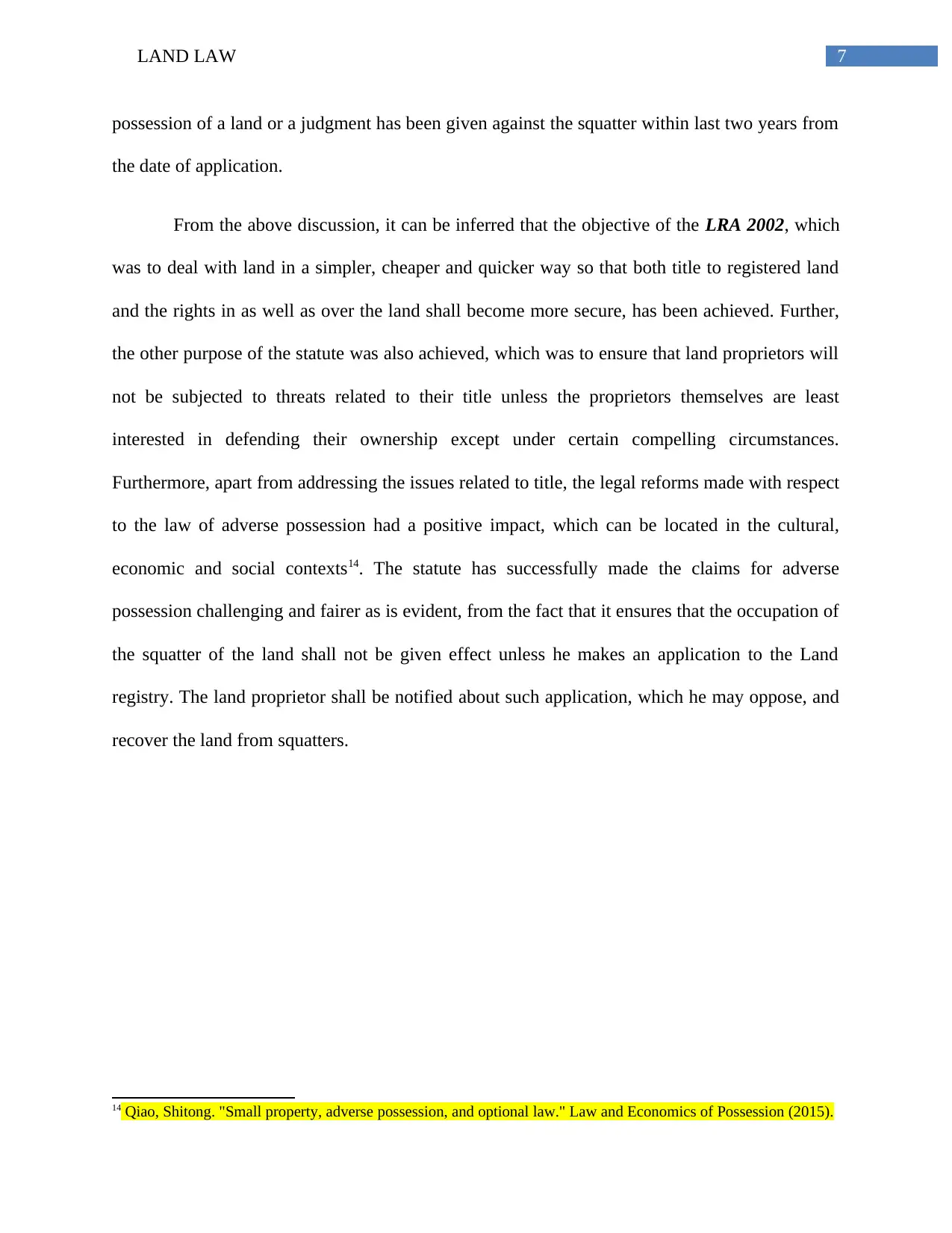
7LAND LAW
possession of a land or a judgment has been given against the squatter within last two years from
the date of application.
From the above discussion, it can be inferred that the objective of the LRA 2002, which
was to deal with land in a simpler, cheaper and quicker way so that both title to registered land
and the rights in as well as over the land shall become more secure, has been achieved. Further,
the other purpose of the statute was also achieved, which was to ensure that land proprietors will
not be subjected to threats related to their title unless the proprietors themselves are least
interested in defending their ownership except under certain compelling circumstances.
Furthermore, apart from addressing the issues related to title, the legal reforms made with respect
to the law of adverse possession had a positive impact, which can be located in the cultural,
economic and social contexts14. The statute has successfully made the claims for adverse
possession challenging and fairer as is evident, from the fact that it ensures that the occupation of
the squatter of the land shall not be given effect unless he makes an application to the Land
registry. The land proprietor shall be notified about such application, which he may oppose, and
recover the land from squatters.
14 Qiao, Shitong. "Small property, adverse possession, and optional law." Law and Economics of Possession (2015).
possession of a land or a judgment has been given against the squatter within last two years from
the date of application.
From the above discussion, it can be inferred that the objective of the LRA 2002, which
was to deal with land in a simpler, cheaper and quicker way so that both title to registered land
and the rights in as well as over the land shall become more secure, has been achieved. Further,
the other purpose of the statute was also achieved, which was to ensure that land proprietors will
not be subjected to threats related to their title unless the proprietors themselves are least
interested in defending their ownership except under certain compelling circumstances.
Furthermore, apart from addressing the issues related to title, the legal reforms made with respect
to the law of adverse possession had a positive impact, which can be located in the cultural,
economic and social contexts14. The statute has successfully made the claims for adverse
possession challenging and fairer as is evident, from the fact that it ensures that the occupation of
the squatter of the land shall not be given effect unless he makes an application to the Land
registry. The land proprietor shall be notified about such application, which he may oppose, and
recover the land from squatters.
14 Qiao, Shitong. "Small property, adverse possession, and optional law." Law and Economics of Possession (2015).
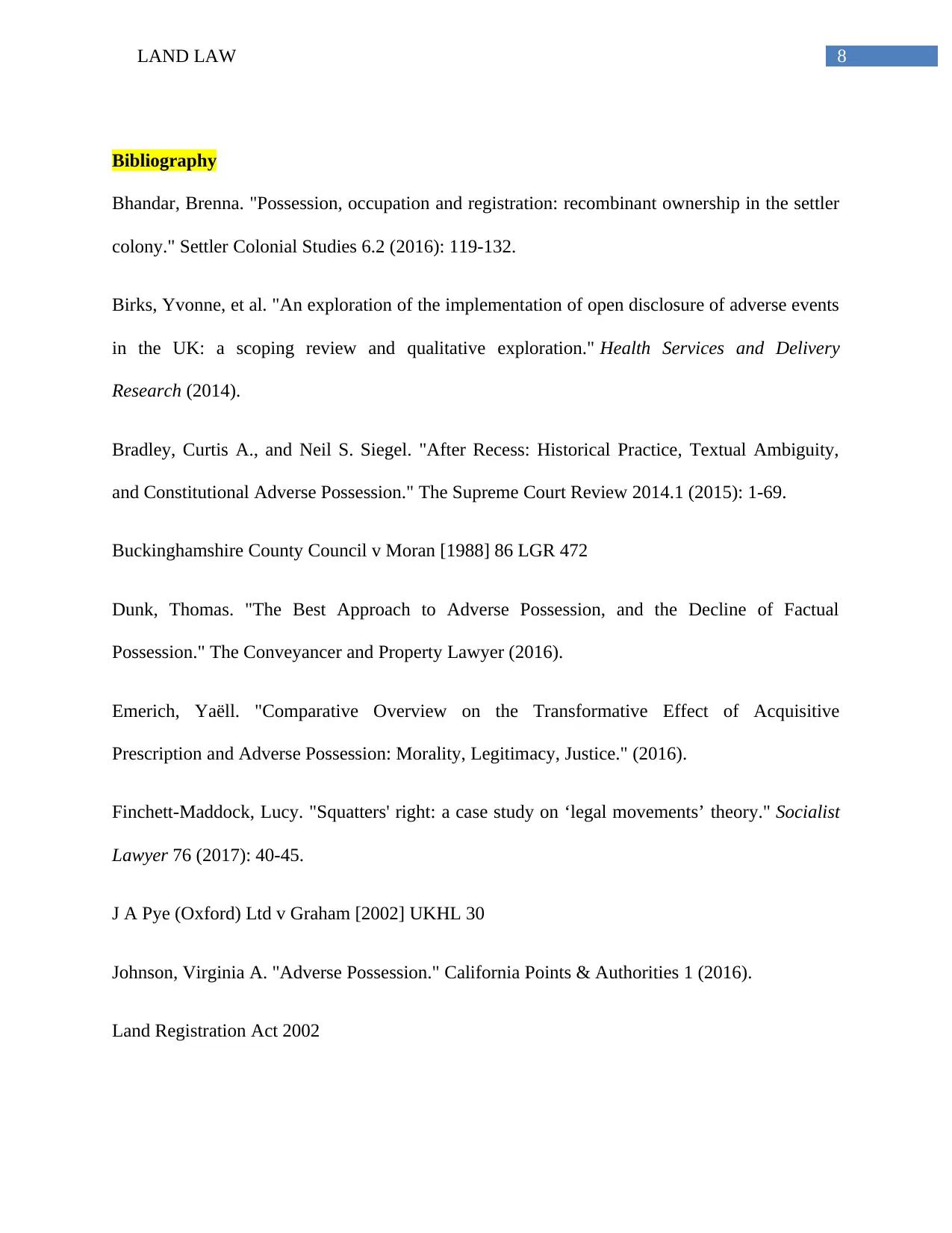
8LAND LAW
Bibliography
Bhandar, Brenna. "Possession, occupation and registration: recombinant ownership in the settler
colony." Settler Colonial Studies 6.2 (2016): 119-132.
Birks, Yvonne, et al. "An exploration of the implementation of open disclosure of adverse events
in the UK: a scoping review and qualitative exploration." Health Services and Delivery
Research (2014).
Bradley, Curtis A., and Neil S. Siegel. "After Recess: Historical Practice, Textual Ambiguity,
and Constitutional Adverse Possession." The Supreme Court Review 2014.1 (2015): 1-69.
Buckinghamshire County Council v Moran [1988] 86 LGR 472
Dunk, Thomas. "The Best Approach to Adverse Possession, and the Decline of Factual
Possession." The Conveyancer and Property Lawyer (2016).
Emerich, Yaëll. "Comparative Overview on the Transformative Effect of Acquisitive
Prescription and Adverse Possession: Morality, Legitimacy, Justice." (2016).
Finchett-Maddock, Lucy. "Squatters' right: a case study on ‘legal movements’ theory." Socialist
Lawyer 76 (2017): 40-45.
J A Pye (Oxford) Ltd v Graham [2002] UKHL 30
Johnson, Virginia A. "Adverse Possession." California Points & Authorities 1 (2016).
Land Registration Act 2002
Bibliography
Bhandar, Brenna. "Possession, occupation and registration: recombinant ownership in the settler
colony." Settler Colonial Studies 6.2 (2016): 119-132.
Birks, Yvonne, et al. "An exploration of the implementation of open disclosure of adverse events
in the UK: a scoping review and qualitative exploration." Health Services and Delivery
Research (2014).
Bradley, Curtis A., and Neil S. Siegel. "After Recess: Historical Practice, Textual Ambiguity,
and Constitutional Adverse Possession." The Supreme Court Review 2014.1 (2015): 1-69.
Buckinghamshire County Council v Moran [1988] 86 LGR 472
Dunk, Thomas. "The Best Approach to Adverse Possession, and the Decline of Factual
Possession." The Conveyancer and Property Lawyer (2016).
Emerich, Yaëll. "Comparative Overview on the Transformative Effect of Acquisitive
Prescription and Adverse Possession: Morality, Legitimacy, Justice." (2016).
Finchett-Maddock, Lucy. "Squatters' right: a case study on ‘legal movements’ theory." Socialist
Lawyer 76 (2017): 40-45.
J A Pye (Oxford) Ltd v Graham [2002] UKHL 30
Johnson, Virginia A. "Adverse Possession." California Points & Authorities 1 (2016).
Land Registration Act 2002
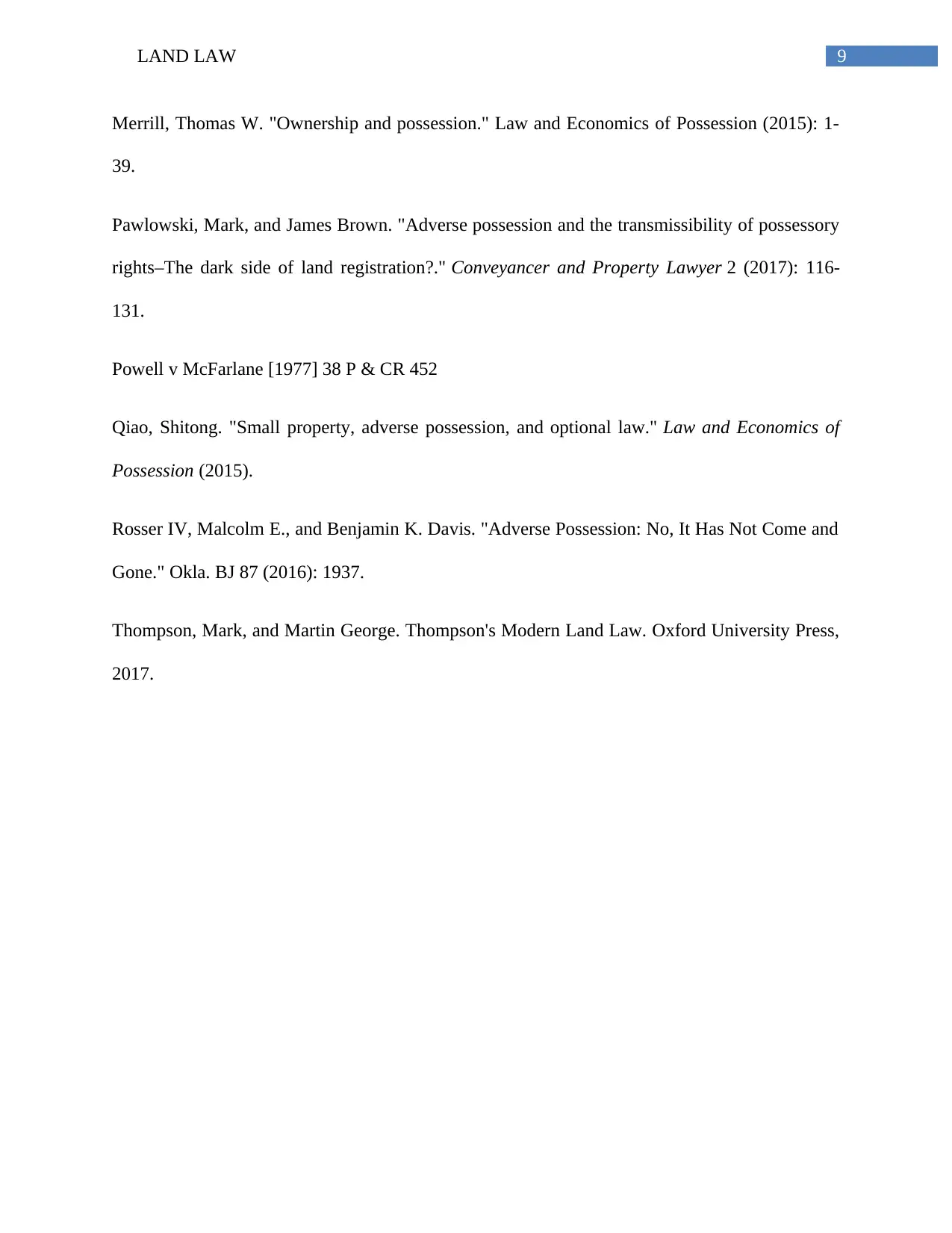
9LAND LAW
Merrill, Thomas W. "Ownership and possession." Law and Economics of Possession (2015): 1-
39.
Pawlowski, Mark, and James Brown. "Adverse possession and the transmissibility of possessory
rights–The dark side of land registration?." Conveyancer and Property Lawyer 2 (2017): 116-
131.
Powell v McFarlane [1977] 38 P & CR 452
Qiao, Shitong. "Small property, adverse possession, and optional law." Law and Economics of
Possession (2015).
Rosser IV, Malcolm E., and Benjamin K. Davis. "Adverse Possession: No, It Has Not Come and
Gone." Okla. BJ 87 (2016): 1937.
Thompson, Mark, and Martin George. Thompson's Modern Land Law. Oxford University Press,
2017.
Merrill, Thomas W. "Ownership and possession." Law and Economics of Possession (2015): 1-
39.
Pawlowski, Mark, and James Brown. "Adverse possession and the transmissibility of possessory
rights–The dark side of land registration?." Conveyancer and Property Lawyer 2 (2017): 116-
131.
Powell v McFarlane [1977] 38 P & CR 452
Qiao, Shitong. "Small property, adverse possession, and optional law." Law and Economics of
Possession (2015).
Rosser IV, Malcolm E., and Benjamin K. Davis. "Adverse Possession: No, It Has Not Come and
Gone." Okla. BJ 87 (2016): 1937.
Thompson, Mark, and Martin George. Thompson's Modern Land Law. Oxford University Press,
2017.
1 out of 10
Related Documents
Your All-in-One AI-Powered Toolkit for Academic Success.
+13062052269
info@desklib.com
Available 24*7 on WhatsApp / Email
![[object Object]](/_next/static/media/star-bottom.7253800d.svg)
Unlock your academic potential
© 2024 | Zucol Services PVT LTD | All rights reserved.





